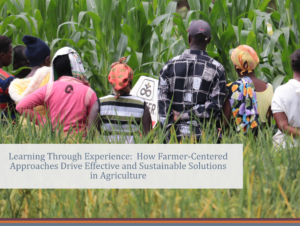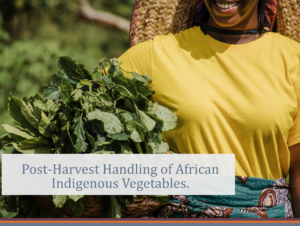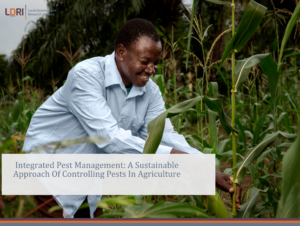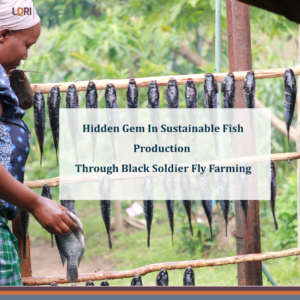![]()
Seeing is Believing: Helping the Kenyan Farmer Adopt Good Agricultural Practice

Kenyan farmers have limited access to extension services which has attributed to a higher ratio of extension officers to farmers. According to NASEP (2012), the ratio is 1:1000 against the FAO recommended ratio of 1:400. This situation has hindered most farmers from keeping pace with the changing technological advances in agriculture. It has also posed a significant challenge for government extension officers working under the Ministry of Agriculture to reach all farmers within their county wards. This is despite agricultural extension being highlighted as a critical agent for transforming subsistence farming to modern and commercial agriculture if efficiently implemented. It is also fundamental in disseminating agricultural information, knowledge and technology along with liaising farmers with other players in the agricultural value chain. Some of these players include the input dealers, the agro-processors, marketers and microfinance financial institutions. Through the provision of extension services, farmers are able to make rational decisions given that they have limited access to agricultural knowledge and productive resources. Ultimately, it improves agricultural productivity thus enhancing household food security, income and reducing poverty among small scale farmers in the rural areas.
In addressing this challenge of high ratio of extension officers to farmers, stakeholders in the agricultural sector in Kenya have adopted the Village Based Advisory (VBA) approach to build the capacity of farmers in Kiambu and Embu County. Through the Local Development Research Institute (LDRI) in collaboration with Innovative Africa AGRA, and the County Government of Kiambu and Embu the project aims to ensure that farmers adopt good agronomic practices in order to increase improve their household incomes to attain food security. In this approach, Village Based Advisors (VBAs) assist in training other farmers within their villages. The VBAs are trained by extension officers and input companies on new and improved agricultural practices and technologies before they disseminate the same information to other farmers within their villages. They work hand in hand with government extension officers at the grass-root level.
This approach has proven effective with extension delivery tools such as a “mother demos” which is being used by VBAs to train other farmers. A mother demo is a small portion of land set aside to demonstrate appropriate line and seed spacing, seed rate, fertilizer application rates among others under local conditions. It provides farmers with an opportunity to experiment, evaluate and learn firsthand about new and improved agricultural practices and technologies, especially in maize production. Having fully trained farmers, VBAs then allow farmers to implement what they have learnt by giving them approximately 25-50 grams of hybrid maize seeds known as ‘small packs’ to establish their own “baby demos”. Baby demos enable farmers to compare local and hybrid maize seed varieties while at the same time giving them an opportunity to observe the differences in yields. Use of demonstration plots in the VBA approach has played a crucial role in providing farmers with information thus increasing their probability of adoption of improved and appropriate agricultural technologies and practices in maize production.
The VBA approach has taken into account the existence of farmers who are risk-averse, especially when adopting new and improved agricultural technologies and seed varieties. As a picture speaks a thousand words, mother demos in the VBA approach haves become an effective way of empowering farmers with agricultural information and knowledge which is fundamental when making farming decisions. Providing farmers with extension services in Kiambu and Embu County will continue to improve their awareness and use of appropriate inputs and agronomic practices leading to increased productivity, food security and reducing poverty.




